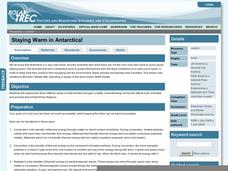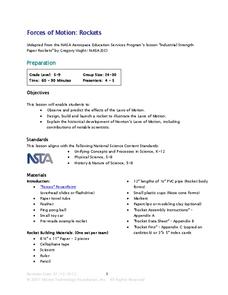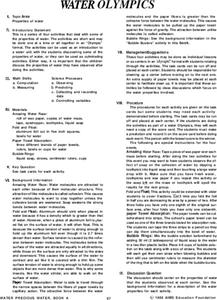Scholastic
Discussion and Dissection of an Owl Pellet
Young scientists get the chance to dissect pellets "owl" by themselves to determine the owls environment and nourishment. This is the third part of a three-part series.
Children’s Hospital of Philadelphia
Meet the Heros
Vaccine development is the focus of a instructional activity that explores its history, timeline, and how the scientific method aids the process. Following a discussion about Edward Jenner and Small Pox, learners answer questions in...
EngageNY
How to Write Like a Scientist in the Field: Introduction to the Elements of Field Journals
It's time to start journaling. Scholars look at examples of science field journals. They work in pairs to examine and complete a note catcher about a field journal. They then add to an anchor chart by discussing the different features...
TryEngineering
Exploring at the Nanoscale
Discover a world too small to see. In the instructional activity, young scientists learn about nanotechnology and brainstorm ideas for new applications of it. They perform an activity to determine how surface area changes when objects...
Berkshire Museum
Meet a Naturalist: Researching, Writing, Interviewing
Young scholars reach out into the community and learn about different environmental science careers in this inquiry-based instructional activity. Beginning with a short research assignment, children gain background knowledge about...
PBS
Alexander Graham Bell: Scientist, Inventor, and Teacher
Hello? Hello? Scholars investigate the impact Alexander Graham Bell's telephone had on the American landscape. Using drawings, video clips, and primary sources, the mind of the inventor comes to light as pupils dream of new inventions to...
EngageNY
Building Background Knowledge: Examining the Unique Living Things of the Rainforests and the Scientists Who Study Them
Gorillas, tigers, and tree frogs ... welcome to the rainforest! Scholars complete a KWL chart to determine what they already know—and what they want to find out—about the rainforest. Next, they participate in a gallery walk, viewing...
EngageNY
Interviewing Meg Lowman: What Does it Mean to be a Responsible Scientist? (Pages 37–39)
Can I ask you something? Scholars read about the night walk on pages 37-39 of The Most Beautiful Roof in the World. After discussing the text with their group, they work together to create interview questions they would ask Meg Lowman....
Curated OER
Science Giants
Fifth graders research about the work and accomplishments of their chosen scientist. In this life science lesson, 5th graders explore how to become one. They prepare a presentation and share it with the class.
Curated OER
Predicting the Future
Students examine how scientists predict the effects of global climate change. In this environmental science lesson, students participate in a discussion about using computer generated data to create climate predictions. Students examine...
Polar Trec
Staying Warm in Antarctica!
Has your class ever wondered how animals and scientists stay warm in the Polar Regions? Kids will investigate to understand the three types of heat transfer and how heat transfer affects those trying to stay toasty in sub-zero...
Curated OER
Making Regolith
You may not be able to take a field trip to the moon, but that doesn't mean your class can't study moon rocks. Using graham crackers as the moon's bedrock and powdered donuts as micrometeorites, young scientists simulate the creation of...
Curated OER
Destination Outer Space
Students investigate space travel. In this space travel instructional activity students examine space exploration history, engineers and scientists involved in space exploration, and Newton's third law of motion. Students make rockets.
Institute of Electrical and Electronics Engineers
Nano Waterproofing
This lesson will make an impact, especially on scientist-athletes who may have an interest in waterproof clothing! Acting as materials engineers, they work collaboratively on waterproofing pieces of cotton fabric. This challenge is...
Growing Classroom
Space Travelers
Groups of three scientists from the rocky planet Zog investigate the composition of soil so that they can take the information back to their home, create soil there, and begin to grow food.
Micron Technology Foundation
Forces of Motion: Rockets
Young scientists design a rocket to launch using Newton's Laws of Motion in order to discover for themselves the forces of motion.
Benjamin Franklin Tercentenary
Science Pen Pals
Learners explore the scientific career of Benjamin Franklin. In this science instructional activity, students discuss Franklin's correspondence with other scientists and write letters describing Benjamin Franklin's experiments.
Curated OER
If I Could Be An Inventor, I Would Invent...
Students create an invention. In this scientific technology lesson plan, students discuss inventors and how their inventions helped others. Students brainstorm ideas for inventions and their rationale behind it. In small teams, students...
Curated OER
Answering Carnival Questions with the Scientific Method
Through the use of a Reading Rainbow episode, clever in-class games and activities, and an ITV Series video, second and third graders engage in a study of the scientific method; what it is, and how scientists use it. This well-designed...
Curated OER
Water Olympics
A fascinating and engaging lesson on the properties of water awaits you. In it, learners engage in four activities that are designed to teach about the properties of water. This exciting plan has worksheets embedded in it which make the...
Curated OER
Simple Machines IV - Levers
The principles of levers and simple machines are presented here. An easy-to-make lever is constructed by each group of scientists, and they use it to explore how this simple machine makes heavy things so much easier to lift and move. A...
Curated OER
Erosion
Young scientists identify erosion, explain the causes of erosion, and name some techniques that can slow the process of erosion. Learners are divided up into groups of four and perform a simulation of soil erosion in class. The...
Curated OER
My Friend, the Volcano
Working in cooperative groups, young scientists research and report on how undersea volcanic activity may benefit marine ecosystems. There are many links to websites that you can use to stimulate curiosity or for pupils to use for...
Desert Discoveries
Keepers of the Prairie
Young ecologists examine the case of the prairie dog, and their near extinction. They read a terrific student handout embedded in the plan, and engage in a class discussion that's based on what they read. Learners perform research on...
Other popular searches
- Famous Scientists
- Famous Scientists Alive
- 10 Famous Scientists
- Cell Theory Scientists
- Famous Scientists Botany
- African American Scientist
- Social Scientists
- Famous Scientists From Italy
- 5 Famous Scientists
- Famous Scientists Reports
- Famous Scientists Project
- 40 Famous Scientists

























